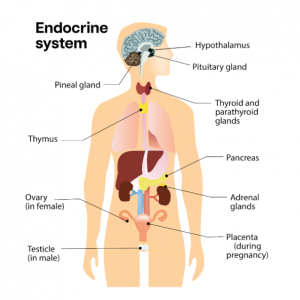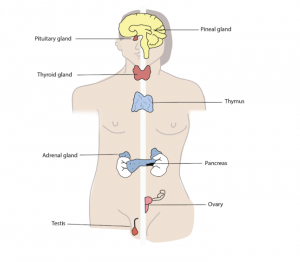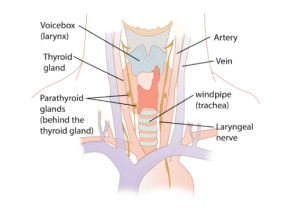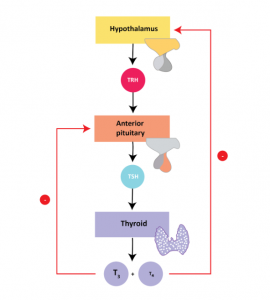Endocrine System: Functions, Organs and Conditions

What is the endocrine system? Your endocrine system consists of many organs known as glands. Hormones are created and secreted by these glands, which are situated throughout your body.
Hormones are molecules that help your body coordinate diverse processes by transporting information through your blood to your muscles, skin, organs, and other tissues. These signals instruct your body on what to do and when.
Endocrine System Functions
Your endocrine system constantly monitors the level of hormones in your blood. Hormones send messages by binding to the cells they aim for and relaying the message.
When hormone levels increase, the pituitary gland directs other glands to cease the production and releasing of hormones. When hormone levels fall below a specific threshold, the pituitary gland can direct other glands to make and release more hormones. This mechanism, known as homeostasis, functions similarly to your home’s thermostat. The functions of the endocrine system are:
- Metabolism
- Development and growth
- Mood and emotions
- Sexual function fertility
- Sleep
- Blood pressure
Sometimes glands generate too much or too little hormone. Excess weight, high blood pressure, disturbed sleep, mood, and behaviour can all result from this imbalance. Many factors can influence how your body produces and releases hormones. A hormone imbalance can be caused by illness, stress, or certain drugs.
Endocrine System Organs

Now, what are the endocrine system’s organs? It consists of glands, which are organs. Glands manufacture and secrete hormones that target certain organs in the body. Your body is covered in glands, including those in your brain, neck, and reproductive organs . Some glands are as small as a piece of food or a pea. The pancreas, which is around 6 inches long, is the biggest endocrine system organ.

Refer to the above-given endocrine system diagram for a better understanding.
1. Hypothalamus
Hypothalamus. While some people do not regard the hypothalamus as a gland, it generates many hormones that regulate the pituitary gland. It regulates various processes, including body temperature, sleep-wake cycles, and hunger. It can also control the activity of other endocrine glands.
2. Pituitary gland
This tiny gland is roughly the size of a pea but performs a critical endocrine system function. It produces hormones that regulate numerous other glands, including the thyroid, adrenal glands, ovaries, and testicles. The pituitary gland regulates many important bodily activities, including growth. It’s at the bottom of your brain.
3. Thyroid gland

Refer to the above-given endocrine system diagram for a better understanding.
The thyroid gland is a gland having the shape of a butterfly. It is located at the front of your neck. It is in charge of your metabolic function.
4. Parathyroid gland
These four small glands are the size of a grain of rice. They regulate the calcium levels in your body. Calcium is required to properly function your heart, kidneys, bones, and neurological system.
5. Adrenal gland
Each kidney has one adrenal gland on top of it. These endocrine system organs secrete hormones that regulate processes such as heart rate, blood pressure, and stress response.
6. Pineal gland
This gland regulates your sleep cycle by secreting melatonin. This hormone makes you tired.
7. Pancreas
Your pancreas is a component of your endocrine system and also plays an important function in digestion. It produces insulin, a hormone that regulates blood sugar levels.
8. Ovaries
The ovaries in women produce sex hormones such as oestrogen, progesterone, and testosterone. Women have a pair of ovaries on each side of their lower abdomen.
9. Thymus
The thymus is located mainly in the upper part of the torso. It stays active until adolescence and generates hormones necessary for forming a kind of white blood cell known as a T cell.
10. Testes
In males, the testes (testicles) produce sperm and secrete testosterone hormone. This hormone influences sperm production, physical strength, and sexual urge.
Hormones of the Endocrine System
Hormones are molecules that the endocrine system utilises to communicate with organs and tissues throughout the body. Hormones move via the circulation to their effector organs or tissue, which possesses receptors that identify and respond to the hormone.
Refer to the endocrine system diagram given above to understand clearly.
The endocrine system produces a variety of hormones, some of which are listed below.
| Name of the hormone | Secreting gland | Endocrine system function |
| Thyroid hormone | Thyroid | Serves to regulate various biological systems, including energy levels and metabolism. |
| Testosterone | Teste, ovary, and adrenal | Contribute to male and female sexual desire and body density, as well as the formation of male sex characteristics. |
| Progesterone | Ovary | When an egg is fertilised, it helps to plan the body for pregnancy. |
| Estrogen | Ovary | Helps to keep a pregnancy, control the menstrual cycle, develop female sex traits, and promote sperm production. |
| Adrenaline | Adrenal | Increases heart rate, blood pressure, and metabolism in response to stress. |
| Aldosterone | Adrenal | Controls the water balance and salt content of the body. |
| Cortisol | Adrenal | Plays an important role in stress. |
| Dehydroepiandrosterone sulphate (DHEA-S) | Adrenal | Stimulates the growth of body hair during puberty and the production of body odour. |
| Follicle-stimulating hormone (FSH) | Pituitary | Controls the production of sperms and eggs. |
| Luteinizing hormone (LH) | Pituitary | Controls testosterone and estrogen production as well as the process of ovulation. |
| Oxytocin | Pituitary | Helps with childbirth, lactation, and mother-child bonding. |
| Prolactin | Pituitary | Promotes production of breast milk. |
| Parathyroid hormone | Parathyroid | Controls the level of calcium in the blood and bone. |
| Melatonin | Pineal | Controls sleep-wake patterns in the human body. |
| Insulin | Pancreas | Help reduce your glucose level in the blood. |
| Glucagon | Pancreas | Help increase the level of blood sugar in the blood. |
Endocrine System Conditions
Hormone levels can sometimes be too low or high. This can have a variety of health consequences. The indications and symptoms are determined by the hormone that is out of balance.
Several disorders can disrupt the endocrine system and change your hormone levels.
- Hyperthyroidism
- Hypothyroidism
- Cushing disease
- Addison disease
- Acromegaly
- Short stature in children
- Diabetes
- Hyperparathyroidism
- Hypoparathyroidism
- Disorders of puberty and reproductive function
Doctors commonly evaluate hormone levels in urine or blood to determine how well an endocrine gland works. When blood levels by themselves do not provide sufficient information regarding endocrine gland function, clinicians test hormone levels:
- At certain times of day, or more than once, or at varying periods of the day (e.g. cortisol).
- Following the administration of a suppressor or stimulant (such as sugar drinks, a hormone, or a drug that can stimulate or inhibit the release of hormone)
- Following the individual’s behaviour (e.g. fasting)
Endocrine diseases are frequently treated by supplementing a deficiency hormone or reducing the levels of an excess hormone. However, the disorder’s underlying cause can occasionally be cured.
How Can You Maintain The Health of Your Endocrine System?
Now that you know what is the endocrine system, you must know how to maintain it. The endocrine system needs the same substances as the remainder of the body to be healthy. You must exercise, eat well, and see your doctor regularly.
Consult your provider if you have a history of thyroid issues, diabetes or PCOS. Managing these situations can assist you in avoiding a hormone imbalance, which can lead to health concerns.
When Should You Consult A Physician?
Some symptoms may indicate a significant medical condition, such as diabetes. If you have any of the following symptoms, contact your service provider:
- The strong need to urinate (pee)
- Extreme thirst, even after drinking lots of water
- Nausea or stomach ache that persists
- Weight increase or decrease that is unexpected
- Exhaustion or weakness to the extreme
- Sweating excessively causes problems
- Sudden instances of racing heart or high blood pressure
- Delays in development or growth
Summary
What is the endocrine system? The endocrine system is a network of organs and glands that aid in the regulation of many physiological activities. This is performed via the endocrine system’s secretion of chemical messengers or hormones.
Frequently Asked Questions
1. What gland is in charge of sugar levels?
The pancreas’ primary role is to stabilise blood sugar levels. It is a big gland that is found behind the stomach. It is responsible for producing glucagon, insulin, and other hormones. Diabetes develops when the pancreas does not create sufficient insulin, or the body does not effectively utilise insulin. This is known as insulin resistance.
2. What gland controls sleep?
Renee Descartes referred to the pineal gland as the “Seat of the Soul,” which is situated in the brain’s centre. The pineal gland’s principal purpose is to accept information from the environment about the condition of the light-dark cycle and use this information to manufacture and release the hormone melatonin.
3. Which gland is referred to as the master gland?
Pituitary gland: Because it oversees the actions of many other endocrine glands, the pituitary gland is frequently referred to as the “master” gland of the endocrine system. The pituitary gland is positioned at the base of the brain and is no bigger than a pea.
